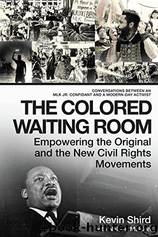The Colored Waiting Room: Empowering the Original and the New Civil Rights Movements; Conversations Between an MLK Jr. Confidant and a Modern-Day Activist by Kevin Shird & Nelson Malden

Author:Kevin Shird & Nelson Malden [Shird, Kevin & Malden, Nelson]
Language: eng
Format: epub
Tags: Ethnic Studies, American, United States, Civil Rights, Social Science, African American & Black Studies, Political Science, 20th Century, History
ISBN: 9781948062084
Google: YeqmDwAAQBAJ
Publisher: Apollo Publishers
Published: 2018-03-26T07:31:09+00:00
So, what now? What kind of racial reconciliation is possible when we have racists walking the streets of America with no fear of retribution, carrying tiki torches and chanting their hatred in vernacular that was crafted one hundred years ago? In an article entitled âWhere Do We Go from Here? Racial Reconciliation in 2017,â Matthew J. Hall asks this question for the Ethics and Religious Liberty Commission of the Southern Baptist Convention. He cites the question that Martin Luther King Jr. faced in 1967, a time when âviolence, hatred and anger had engulfed much of the country.â Back then, King called for nonviolent demonstrations as a form of direct action and protest. He also spoke of the âfierce urgency of nowâ in his famous speech at the March on Washington. In his view, this call to direct action was rooted in a âbiblical vision of the world and Godâs purposes.â
Looking around at the racial violence being perpetrated in America today, some concerned citizens might wonder whether there is realistic hope for an implementation of Kingâs nonviolent demonstration approach. How can such indifference to human dignity be met with nonviolent force? As Hall emphasizes, King also spoke about love being the highest good. While simple optimism, a belief that others will easily change their minds and see the light, may no longer be enough to inspire us, a more enduring attitude is that in spite of the challenges, we can continue to focus on hope and loveââlove for God, love for neighbor.â
The ideal should be to replace hate and anger with love, but we also need to reform the social and legal systems that continue to undermine racial equality in this country. One important aspect of the marches in Selma that people watching them on television may have not understood was that the protests started not with an abstract idea, but with very practical concerns: voter registration and the right to vote without discrimination. Voter registration is important because voting is not only critical for full participation in a democracy and electing the candidates you support, but it also directly affects the court system and the justice system; the connection between the two was critical for black people in Selma.
Registering to vote is also the only way for your name to get into a jury pool. The jury pools for the county courts are compiled from the countyâs list of registered voters. If African Americans couldnât register to vote, that also meant that their names wouldnât be part of the pools to be called to serve on a jury. So, the phrase âa jury of your peersâ was rarely applicable to a black defendant in a Selma courtroom, who most often would be left facing an all-white jury. As a result, there were massive disparities in conviction and sentencing outcomes for black defendants, compared to white defendants charged with the same crime.
Nelson once told me that âItâs important to have discussions today about the lynchings that occurred in the South and
Download
This site does not store any files on its server. We only index and link to content provided by other sites. Please contact the content providers to delete copyright contents if any and email us, we'll remove relevant links or contents immediately.
Cecilia; Or, Memoirs of an Heiress — Volume 1 by Fanny Burney(32059)
Cecilia; Or, Memoirs of an Heiress — Volume 3 by Fanny Burney(31455)
Cecilia; Or, Memoirs of an Heiress — Volume 2 by Fanny Burney(31406)
The Great Music City by Andrea Baker(30780)
We're Going to Need More Wine by Gabrielle Union(18630)
All the Missing Girls by Megan Miranda(14721)
Pimp by Iceberg Slim(13777)
Bombshells: Glamour Girls of a Lifetime by Sullivan Steve(13683)
Fifty Shades Freed by E L James(12909)
Talking to Strangers by Malcolm Gladwell(12869)
Norse Mythology by Gaiman Neil(12821)
For the Love of Europe by Rick Steves(11449)
Crazy Rich Asians by Kevin Kwan(8886)
Mindhunter: Inside the FBI's Elite Serial Crime Unit by John E. Douglas & Mark Olshaker(8699)
The Lost Art of Listening by Michael P. Nichols(7159)
Enlightenment Now: The Case for Reason, Science, Humanism, and Progress by Steven Pinker(6871)
The Four Agreements by Don Miguel Ruiz(6313)
Bad Blood by John Carreyrou(6274)
Weapons of Math Destruction by Cathy O'Neil(5829)
